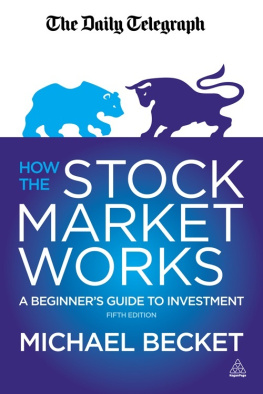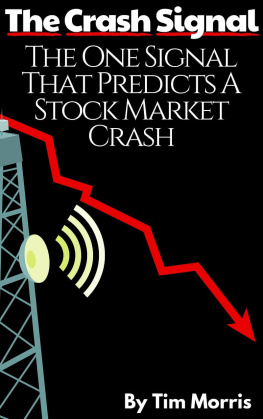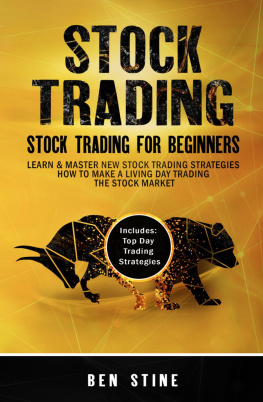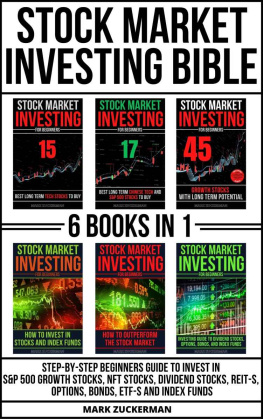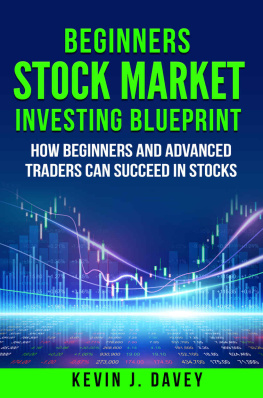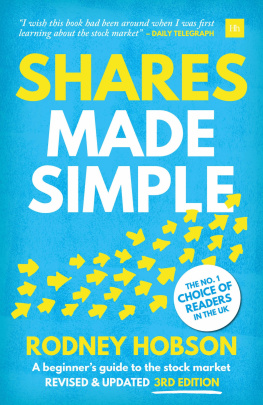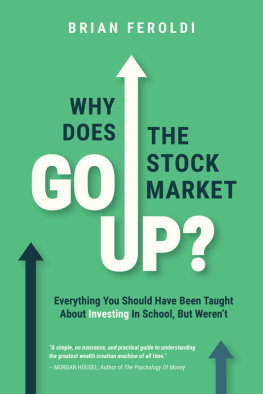I would like to thank the great help provided by the Wealth Management Association ( www.thewma.co.uk ) in providing very helpful advice and up-to-date information on the market, and for the careful help of the London Stock Exchange in vetting the accuracy of the text.
I would also like to thank Barclays Capital for the charts from its publication, Barclays Bank Equity Gilt Study .
And of course I remain constantly grateful for the help, patience and encouragement of my wife Kay.
B usinesses need money to get started, and even more to expand and grow. When setting up, entrepreneurs raise some of this from savings, friends and families, and the rest from banks and venture capitalists. Backers get a receipt for their money which shows that their investment makes them part-owners of the company and so have a share of the business (hence the name). Unlike banks, which provide short-term finance at specified rates that has to be repaid, these investors are not lenders: they are the owners. If there are 100,000 shares issued by the company, someone having 10,000 of them owns a tenth of the business.
That means the managing director and the rest of the board are the shareholders employees just as much as the shop-floor foreman or the cleaner. Being a shareholder carries all sorts of privileges, including the right to appoint the board and the auditors (see ). In return for risking their money, shareholders of successful companies receive dividends. The amount varies with what the company can afford to pay out, which in turn depends on profits.
At some stage the business may need more than those original sources can provide. In addition, there comes a time when some of the original investors want to withdraw their backing, especially if it can be at a profit. The only way to do that would be by selling the shares, which meant finding an interested buyer, which in itself would be far from easy, and then haggling about the price, which would be awkward. A public marketplace was devised for trading them a stock exchange. Companies go public when they get their shares quoted on the stock exchange to make things easy for investors a neat little device invented by the Dutch right at the start of the 17th century.
Once a company gets its shares quoted on the stock exchange there is a continuously updated and generally known market price, which is usually far higher than the level at which the original investors put their money into the fledgling business. In addition, there is a liquid market, meaning there are large numbers of potential or actual traders in the paper, and so holders of the shares have a far greater chance of finding buyers, and people who want to put money into the business have ready access.
Blue chips
All investment carries a risk. Banks can run into trouble and companies can go bust. It has an element of gambling and, as you would expect, the odds vary with what one invests in. The major difference is that the only way to win at true gambling is to own the casino or to be a bookmaker, while in the world of the stock market the chances of a total loss are relatively small and with careful investment the prospects are pretty good.
It is usually agreed that casinos should, in the public interest, be inaccessible and expensive. And perhaps the same is true of Stock Exchanges, wrote John Maynard Keynes in 1935. He himself made a small fortune on the exchange but it is salutary to be reminded of the analogy from time to time and the comparable risks; the term blue chip is an example. The highest value gambling chips in poker were traditionally blue, and the stocks with the highest prestige were reckoned similar. So the companies described as being blue chip are the largest, safest businesses on the stock market.
The companies in the FTSE100 Index, being the hundred biggest companies in the country by stock market valuation, are by definition all blue chips. That is reckoned to make them the safest bets around. The theory is not unreasonable large companies are more stable than small ones; they can hire the best managers and fund the biggest research budgets; they have the financial muscle to fight off competition; their very size attracts customers; and the large issued share capital generally speaking provides a liquid equity market with many small investors and so maintains a steadier price. In practice some smaller companies, even in the Alternative Investment Market, sometimes can also provide the comfort of a liquid market as a result of brisk trading in the shares.
The corollary to that is the share price movements should be less violent, giving stability (but providing fewer chances of short-term profits through hopping in and out), and the yield is likely to be lower than on riskier investments. Blue chip shares are, in the traditional phrase, the investment for widows and orphans.
But not invariably: blue chips are safer than a company set up last year by a couple of undergraduates with a brilliant idea, but they are never completely safe. They may be about the most solid there is but they still need to be watched. As an illustration, it is instructive to look back at the Index of the largest companies of, say, the past 30 years and see how few remain. Remember that companies like British Leyland, Rolls-Royce and Polly Peck were all in the Index at one time, and all went bust though with government help Rolls-Royce did re-emerge as a successful, quoted aero-engine manufacturer. Huge banks were humbled across the world in 2008 as a result of their feckless lending, and even companies that do not completely collapse can fall out of favour, have incompetent managers, and shrink to relative insignificance (such as the British company General Electric, which shrank and then became the private company Telent).
The reason not everyone seeks the safety of blue chip shares is their price so well known that they are pretty fairly valued, and so the chances of beating the market are vanishingly slim. Being generally multinational, they are also exposed to currency fluctuations.
The next set of companies just below them in market value, the FTSE250, is generally more representative of the British economy, which is closer to home and hence more easily understandable.
Finally, small and new entrepreneurial companies may be more risky but that means they have the potential for faster growth and greater returns provided of course they do not go bust. It is also worth remembering that even companies like Microsoft, Tesco, Toyota and Siemens were tiny once.
So, not all small companies are dangerous just as not all big ones are safe. This is true even of the multinational darlings that were reckoned deep blue. Just consider the fate of the major American airlines, insurance companies or car makers.
That is why tracker funds have been set up. They buy most of the shares in the index they are tracking and so follow its totality. Trackers reduce the chances of a disaster, mitigate the chances of great capital growth, and should ensure a steady dividend flow.
Shareholders benefit twice over when a business is doing well: they get dividends as their part of the companys profits, and the value of the shares goes up so that when they sell they get capital appreciation as well. The return on shares over the long term has been substantially better than inflation or the growth in pay and notably better than most other homes for savings. According to data from Credit Suisse, Global Financial Data and Thomson Datastream, the return on US shares between 1904 and 2004 was very nearly 10 per cent per annum, and 8.5 per cent on UK shares.
If the company fails to make a profit shareholders usually get nothing, though some companies try to keep them happy and loyal by dipping into reserves to pay a dividend even at a time of loss. In any case, if the company goes bust they are at the back of the queue for getting paid. On the other hand, one of the reasons a business is incorporated (rather than being a partnership, say) is that the owners, the shareholders, cannot lose more money than they used to buy the shares. That is in sharp contrast to a partnership, where each partner has unlimited personal liability they are liable for the debts of the business right down to their last cuff-links or to their last earrings. So even if an incorporated company goes spectacularly broke owing millions of pounds, the creditors cannot come knocking on the shareholders door.
Next page
